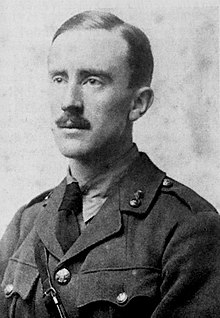With a release date recently set for Tolkien, the biopic about the life of acclaimed fantasy author J.R.R. Tolkien, I realized that it’s been awhile since I’ve gushed about Tolkien and his works here at Nerds On Earth. Which is weird, because I started here by writing a series of primers on The Silmarillion, Tolkien’s masterwork.
First of all, there’s probably nothing I can say about Tolkien that hasn’t already been said more eloquently by others. He is one of the most studied, admired, imitated, and beloved authors of all time. Full stop. And, he’s about to join the ranks of those few academic and literary figures who have had a biographical movie made about their life.

Honestly, how many professors and authors have lives that are interesting enough to commit to a major motion picture? I sincerely hope that movie is amazing, by the way, because Tolkien’s life certainly was. World War I veteran, husband, father, culture-shaping creator, brilliant scholar… It’s so easy to forget that writing was essentially Tolkien’s hobby; by trade he was a philologist and lecturing professor at Oxford University.
But let’s get back to those culture-shaping creations, because the other thing that’s easy to forget is that Tolkien’s explicit goal with his writing was to create a national mythology for England, much as the Brothers Grimm had done for Germany. He wasn’t just writing fantasy stories to entertain. He was attempting to enter into the lofty realm of traditional stories that become an essential part of the cultural fabric and identity of a people.
I don’t know if Tolkien was successful in this pursuit, because I’m not super plugged into English culture. But I will say for certain that his works have become a part of my personal mythology.
Myths are stories that we (humans) tell ourselves in order to pass on information that we feel it is important to know. They might explain a natural phenomenon. They might be instructive on how we should act in a given situation. They might be a cautionary tale of what not to do. They might simply commemorate a great event in a people’s history that they feel it is important to remember.
This is the heart of Tolkien’s work, particularly in Lord of the Rings and The Silmarillion. Here are some of the important things to remember that I come back to again and again in Tolkien’s myths. For the sake of clarity, I’ll stick to just LOTR for examples.
The power of the ordinary
To Tolkien regular, ordinary, simple people are Hobbits. They are peculiar, industrious when necessary, joyful on most occasions, and content with how things are. Yet it is Hobbits who are ultimately the chosen vessels to accomplish the greatest deed of the Third Age – not immortal, wise, magical elves; not mighty, ambitious, fiery men; not powerful and ancient wizards.
Simple, ordinary Hobbits, who take a great deal of prodding but are ultimately capable of accomplishing seemingly impossible tasks.
The importance of friendship
The obvious example here is Frodo and Sam, but a deeper look (at Tolkien’s whole body of work, too…) reveals something sort of astonishing to me – no one, and I mean no one, succeeds on their own. Tolkien’s heroes are not Greek legends whose special nature and abilities enable them to accomplish monumental tasks alone.
Instead they are real people (and elves, hobbits, etc.) who must rely on the people around them. They must trust. They must risk betrayal. They must hope. They must live in relationship with one another. In a world populated with magic, god-like beings, deadly enemies, fierce warriors, and the occasional eucatastrophe, every character’s greatest asset is the people around them.
The dangers of seeking power

The only characters in Tolkien’s works who escape relatively unscathed are those who do not seek power, and especially power for the sake of lording it over others. Smeagol desires to remain in possession of the ring, and ultimately ends up getting his wish at the bottom of a volcano. Sauron spends his entire existence in service to gaining power, and ultimately ends up vanquished. Boromir tries to take the ring for the sake of his own people, and it leads to his downfall. Saruman tries to gain power through deception and betrayal, and is ultimately betrayed. Denethor seeks to use the power of the palantir for the good of Gondor (a good purpose!), and is ruined by the lies he is shown through it. The Ringwraiths were once-noble kings of men who took power that they had not earned in the form of rings from Sauron, and were slowly bent to undying service of his will.
I could go on, but you get the idea… On the other side of that coin you have characters like the elvish lords Galadriel and Elrond, and the human king Aragorn, who attain great power out of a desire to use it justly to improve the lives of others.
Doing the right thing might cost you, but it’s still the right thing
There are so many examples of characters embodying this… The one that most immediately comes to mind is the death of Boromir. He was a mighty warrior; he could have fought his way out of the situation he found himself in. Instead, he chose to stand and fight so that Merry and Pippin could get away – two Hobbits who were basically tag-alongs at that point in the story.
There was no reason for him to sacrifice his own life to try to ensure the escape of two characters who weren’t ring-bearers, except that the right thing to do is protect and defend those who can’t do so themselves.
Nothing and no one is irredeemable
With the possible exception of Sauron and the Ringwraiths (but that’s a story from The Silmarillion…), no character is ever beyond the point of no return as long as they’re living. Heroes like Boromir, Theoden, and Gimli make selfish or unwise choices, that they then have the opportunity to correct, often at great personal cost.
Villians like Saruman and Wormtongue are sincerely given every opportunity to come back to the side of good.
Even Gollum, who was so twisted and ruined by possessing the ring for so long has moments of redemption before ultimately succumbing to the ring’s allure. The note of optimism in humanity is refreshing throughout Tolkien’s works.
Hope and faith that good will ultimately win
Look, I’m not going to get political here, but whatever side of the political spectrum you find yourself on, there are reasons to look around and think that good is losing. What Tolkien (who fought in World War I when it looked hopeless for the Allies, and lived through World War II which looked hopeless for the Allies for a time) conveys through scenes like the final battle between the forces of Sauron and the remaining free people of Middle Earth, is that even in the face of seeming defeat, even in the face of hopeless odds, there is still a chance for good to prevail for as long as those who seek it will persevere.
There are probably half a dozen or more that I could pick out and expound upon here just from Lord of the Rings. And there are even more examples in The Silmarillion, if you’re up for a deep dive into Tolkien’s creation. If you’re a Tolkien reader, maybe set aside some time to reread his work with fresh eyes. And if you’ve never dived into the world of Middle Earth (or the world that preceded it…), then do yourself a favor give it a try.

